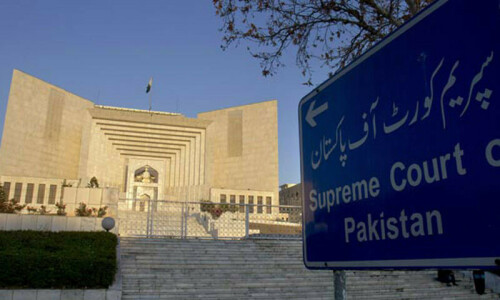 Cycling is fun, economical, environment-friendly, and a healthy way to travel. In the rich countries, governments recognise cyclists’ rights on the roads and provide safe corridors for exclusive use of paddlers.
Cycling is fun, economical, environment-friendly, and a healthy way to travel. In the rich countries, governments recognise cyclists’ rights on the roads and provide safe corridors for exclusive use of paddlers.
But, the question arises why has cycling not been promoted as a popular and cheap means of transport in Pakistan? Is it not feasible or is there some pressure from the auto manufacturers who fear that encouragement of cycles may lead to drop in their sales?
And why has the government not included bike lanes in their multi-lane roads in almost all major cities of the country. Is it a deliberate policy or the policy-makers are not aware of this mode of transport? In almost all rich countries of the world, cycling is promoted officially and comes under the ministry of communication.
In Pakistan where bicycles are regarded as the poor man's transport and the poor come last in government planning priorities, this transport which is considered more respectable than cars in advanced countries has been a victim of official neglect. Since the rich do not ride bicycles, the poor here also consider cycling to be an undignified mode of transport. As a result, our roads clearly show this prejudice and point to the pro-rich policies of the government.
Cycling is also considered unsafe as indeed it is on our roads with poor traffic control and bad condition of the roads. Therefore, safety concerns are also a barrier to getting more people on the bikes. It depends on the government how to improve the safety for cyclists by improving infrastructure and road user behaviors.
Automobile advertisements dominate the media and hardly ever one sees any campaign to popularize cycling by demonstrating its health and environmental benefits. The government planners also ignore the fact that use of cycles can cut down import of petrol and the need to have wider and wider roads. Taxpayers’ money is squandered to widen roads for the rich and buy petrol for their cars while completely ignoring the interests of the cyclists and pedestrians.
Pakistan's annual oil import bill has already crossed $11 billion last year, which edged up from $7 billion a year earlier owing to greater consumption in the wake of rising usage of private vehicles in the country.
With this high import bill, the country has sought loan of $7.6 billion from the International Monetary Fund (IMF) in November last to avoid economic meltdown and default on foreign loans owing to freezing foreign exchange reserves of the country.
Now it is clear that the encouragement of cycling and providing infrastructure for it will not only help the government to save the foreign exchange for the kitty but it would also help in overcoming the growing economic crisis, restore the environment and make people healthier.
Government encouragement of cars and even two wheelers (motorcycles) has made the future of local cycle industry bleak. Many domestic cycle industries closed down owing to various reasons mainly low demand from consumers.
Government is already providing subsidy and reducing tariff on motorcycles to encourage their imports. This encouragement reached its crudest level when the former government boasted the numbers of motor cycles and mobile phones being sold or in use of consumers as a sign of prosperity.
Islamabad like any developed cities of the world can be a bike-friendly city. What we need is that the Capital Development Authority comes up with a plan to promote cycling habit in the federal capital.
The multi-lane roads being built in the city with under passes or flyovers to accommodate the rising vehicular traffic can be added with bike lanes along the full length of these roads. Besides, these lanes, the civic body will also have to provide bike parking and security facilities for bicycle commuters.
Cities from New York, Chicago to San Francisco, Australia, the Netherlands have installed miles of dedicated bike lanes, instituted bicycle days in which major streets are closed to cars and launched programmes to promote cycling which helps in reducing killer diseases like cancer, stroke and heart attacks etc.
The time that is spent on traveling is also used for exercise in this way. Cycling is also helpful in bringing about social harmony by reducing the visible rich poor gap.
Cycling has also a key role in the creation of sustainable environment. It is a known fact that cycling does not emit greenhouse gas causes water or air pollution or rely on fossil fuels. Cycling can also contribute to reduce congestion, which improves the quality of life of the residents.
Experts are of the opinion that the current congestion in the growing vehicular traffic in the federal capital can also be addressed if school students could be motivated for using the cycles. There are more than 400 educational institutes in the federal capital. Not only the fuel can be saved but it would also help in maintaining beauty of the capital, which is rapidly degrading.
It would also be economical for the parents of the students who are facing highest ever school fees that leaves little for other activities.
This is just one example as army of low-grade employees in the federal capital is also facing the same situation. The encouragement of cycling would help them to save money, which can be easily diverted towards food, education, health etc.
khanmubarak@yahoo.com













































Dear visitor, the comments section is undergoing an overhaul and will return soon.